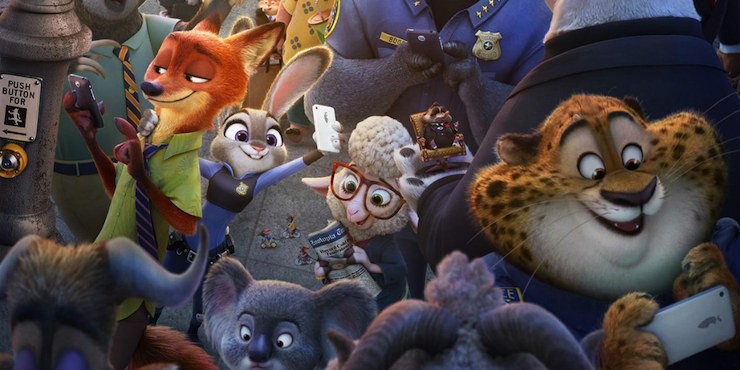Talking animals are popular for two obvious reasons:
- They’re cute.
- Everything they say and do is probably about us.
Good science fiction is very often social commentary about “real” things dressed up in a way that is both close enough to the truth, and complexly unique enough to be its own brilliant thing. Which is why the odyssey of Bunny Police Officer Judy Hopps in Zootopia is socially conscious science fiction storytelling at its finest.
Ontologically, the premise of Zootopia is working with a familiar science fiction trope: imagine there’s an Earth populated by intelligent creatures who are not humans. But, unlike Planet of the Apes or some other evolutionarily-angled science fiction world, humans don’t seem to have existed here, ever. Zootopia never once mentions human beings, putting itself squarely in a parallel universe in which we never showed up. You might say this is all for the convenience of making a cute kids’ movie, and you might be right, at least partially. The animals in the fictional city of Zootopia (and its suburbs) have smart phones, speak English and worship pop-stars, meaning you might feel like the the analogs are a little too on the nose. But the film embraces the idea that these are evolved animals and not simply animals who act like people—science fiction is what rules the day here, not cutesy animal fantasies.
Overwhelmingly, Zootopia is a science fiction adventure about tolerance. Our protagonist is Judy Hopps (Ginnifer Goodwin), a bunny who wants to be a cop, which is something that’s considered laughable since we all know bunnies are supposed to be carrot farmers! When Judy Hopps teams up with a criminal Nick Wilde (Jason Bateman)—who happens to be a fox—more animal stereotypes are reinforced: a fox is sly, and also potentially vicious and harmful. Without spoiling the plot, the through line of Zootopia wonders if these intelligent animals can overcome their “natures,” if being a member of a predatory species is something that makes you an actual predator. Judy, Nick, Police Chief Bogo (a bull voiced by Idris Elba), and the rest of the animal characters face various forms of prejudices throughout the film all based on what species they are. The spin here is that like a hopeful Star Trek-style future, all of these animals actually co-exist in Zootopia.
All of this is carefully thought-out by the long list of writers who worked on this movie. (Seriously, there are like ten.) When we find ourselves in the city of Zootopia, we understand that a certain level of basic tolerance is the norm; but mirroring our own brave-new-world, it’s not always clear how much further we all have to go in terms of figuring out the ideal form that tolerance should take. My favorite example of this happens early in the movie, when Judy has her first day at the police station. A bobcat refers to here as “cute,” and she replies, “Well, the thing is, when other rabbits call each other cute, it’s one thing, but…” In the theatre I saw the film in, everyone laughed. We laughed because we recognized the analogy to the existence of actual insensitive language, and we’re relieved to have our societal problems being presented to us in a way both familiar and unfamiliar, too. We can both laugh at Judy’s plight as a bunny cop, but understand that if Zootopia were real, she—and all variety of her fellow animals—would have a tough time all getting along.
The plot structure of Zootopia borrows from countless cop procedurals, but I also caught at least one (maybe unintentional!) Sherlock Holmes reference. The Sir Arthur Conan Doyle story “The Creeping Man” features old Professor Presbury, who takes an extract from langur (monkey) glands in an effort to make himself more virile, and instead reverts into a kind of predatory monster. Zootopia introduces a similar science fiction device—and kind of animal-specific version of the gas used by the Scarecrow in Batman—that makes the predator animals lose the veneer of civilization and go, well, totally wild. Shades of classic Star Trek are present here too, in the idea that Captain Kirk has an “evil side” that could just be an inherent part of his personality, which his intellect and compassion, or humanity, controls.
There are no humans in Zootopia though, and the set of mores that a confederation of intelligent animals might possess isn’t only played for gags. Sure, there’s a bit about a “nudist” animal commune, in which Judy is freaked out to see elephants without clothes on. And while this might seem excessively silly, it does help to sell us on the reality of this imagined world, which means that the conflicts within it become something we can totally buy.
In almost all ways, Zootopia is a refreshingly original sci-fi family film that could only be made right now; general audiences are comfortable enough with certain speculative tropes, and the approach to the premise of talking animals is handled deftly and with more sophistication than most other films of this ilk (see: all the Ice Age movies). This movie gives anyone who is interested in moral experiments among non-humans plenty to think and talk about.
I love sci-fi books and stories featuring talking animals: O’brien’s Mrs. Frisby and the Rats of NIMH, Lethem’s Gun With Occasional Music, Robert Repino’s Mort(e). To that list, I’ll happily add Zootopia.
Ryan Britt is the author of Luke Skywalker Can’t Read and Other Geeky Truths. His writing appears regularly with Den of Geek, Electric Literature, The Barnes & Noble Sci-Fi/Fantasy Blog and here on Tor.com.










